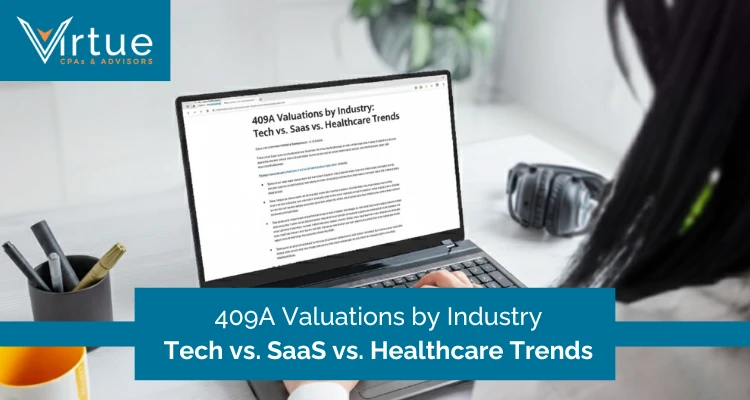If you’re running or advising a startup, you’ve likely heard of 409A valuations.
But have you ever asked: Do such valuations differ by industry?
The short answer is yes — Tech, SaaS, and Healthcare each place unique pressures and assumptions on how value is assessed.
But to grant those shares legally and with confidence, you need something called a 409A valuation.
This valuation determines the fair market value (FMV) of your company’s common stock — a critical number that helps you avoid serious IRS penalties.
In this post, we’ll:
- Explain what a 409A valuation really means and why it matters
- Show how valuation drivers shift across Tech, SaaS, and Healthcare
- Provide a side-by-side comparison so you can see what to expect
- Lay out best practices so your 409A is defensible and clear
Let’s dive in!
What is 409A Valuation?
A 409A valuation is an independent assessment of your company’s common stock’s fair market value.
It’s rooted in Section 409A of the U.S. Internal Revenue Code , which governs how deferred compensation — including stock options — must be handled.
If you issue options at a strike price below FMV, employees may face tax penalties, plus interest and a 20% extra tax.
To avoid that, many startups obtain a 409A valuation via a qualified third party, aiming for a “safe harbor”. If done correctly, the IRS must prove your valuation is “grossly unreasonable” to challenge it.
409A Valuation Approaches
Valuation firms lean on three broad approaches:
- Market Approach (e.g., backsolve / option pricing model) — they examine how much investors are paying for preferred shares and reverse-engineer what common shares are worth.
- Income Approach — you forecast future cash flows (or profits), discount them to today, and assign value. This works well when your business has stable revenue.
- Asset (Cost) Approach — sum up your asset minus liabilities. This tends to show up when you have physical or financial assets, or in companies that aren’t yet generating significant revenue.
In practice, valuation firms often use a hybrid or weigh different methods based on stage, risk, and industry.
Key Valuation Inputs
To get a reliable value, your valuation provider will want:
- Historical financials, forecasts, and growth plans
- Comparable company metrics (multiples, public comps)
- Capital structure and preferred vs. common equity rights
- Market conditions and macro trends
- Risk adjustments, such as discounts for lack of marketability (DLOM), because private stock can’t be traded freely
409A Valuations in the Tech Industry
In tech, everything revolves around innovation, scalability, and disruption.
You often see heavy R&D spend, shifting strategies, and rapid product evolution.
Many tech startups operate with variable revenue paths: some scale quickly, others pivot.
You face pressure from investors to show growth, even if profitability is farther down the road.
Valuation Drivers
For tech companies, key drivers often include:
- Intellectual Property & Intangibles — code, algorithms, data, trade secrets
- Market potential & TAM (Total Addressable Market) — how big your market can become
- User traction & metrics — adoption, retention, growth curves
- Competitive moats — what differentiates you from the pack
Tech valuations also often use comparables from recent funding rounds or public tech peers, but with adjustments for stage and risk.
Common Challenges
When you’re operating in tech, the valuation process bumps into obstacles like:
- Volatility & unpredictability — things change fast
- Unclear revenue paths early on
- Investor expectations & hype cycles
- Lack of sector-specific comps at early stages
Because of this, 409A appraisers often err on the conservative side to maintain defensibility.
In short, while growth still matters, execution and defensibility are commanding more weight.
409A Valuations in the SaaS Industry
If your business follows the subscription model, SaaS has a unique logic. Let’s break it down.
SaaS companies work on recurring revenue (ARR or MRR). That recurring nature gives you predictability, which is attractive from a valuation lens.
In other words, investors can see what revenues might look like in 12–24 months.
That’s not always true in other tech or healthcare businesses.
Key Metrics
These metrics often make or break your valuation in SaaS:
- ARR / MRR — how much recurring revenue you're bringing in
- Churn rate — how many customers drop off
- CAC (Customer Acquisition Cost)
- LTV (Lifetime Value)
- Net retention/expansion revenue
Valuation models use those metrics to shape growth expectations, retention assumptions, and discount rates.
Valuation Multiples & Methods
In SaaS, it's common to see valuation multiples on ARR (e.g., 5×, 10×, even higher if growth is strong).
But those multiples vary by stage, growth rate, retention, and margin profile.
Because of that, your valuation provider might:
- Apply a multiple to ARR (or projected ARR)
- Use comparables from public SaaS companies, adjusted for scale
- Run a discounted cash flow projection
- Adjust for risk, churn, and market saturation
2024–2025 SaaS Trends
Some shifts in recent years that you should watch:
- Investor focus shifting to efficiency — high growth is great, but the market now rewards more sustainable growth
- Higher emphasis on net retention and expansion revenue
- Valuation multiples are getting more conservative after past exuberance
- Tougher comparisons — more mature SaaS peers demand stricter assumptions
So while SaaS remains one of the more “straightforward” valuation models, assumptions still make all the difference.
409A Valuations in the Healthcare Industry
Healthcare (including biotech, medtech, digital health) is a whole different world. Your valuation journey here looks very different.
In healthcare, you're often dealing with long development cycles, regulatory approvals (FDA, etc.), clinical trials, and huge capital needs before revenue.
Some firms are pre-revenue for years. In digital health, things may move faster, but regulatory and reimbursement complexity still looms.
Valuation Drivers
When you work in healthcare, especially biotech or medtech, the value drivers shift to:
- Pipeline & clinical stage — how far along your drug/device is
- Patent / IP portfolios — strength and breadth
- Regulatory milestones — approvals, trials, risk of failure
- Addressable market & reimbursement models — who will pay, how much
Your valuation firm must factor in the high risk of failure, long timelines, and uncertain exit paths.
409A Valuation Challenges
Compared to SaaS or tech, healthcare presents these challenges:
- Pre-revenue positioning — you may not have reliable revenue forecasts
- High regulatory or technical risk — trials can fail, regulations can change
- Limited comps — fewer direct comparables, and often large adjustments
- Longer time horizons increase discounting
Sometimes, valuation firms will lean more on option models or simulations rather than straightforward DCF when certainty is low.
Comparative Analysis: Tech vs. SaaS vs. Healthcare
Now let’s set these side by side so you see the contrasts clearly.
| Industry | Common Multiple / Metric Basis | Risk / Discount Pressure |
|---|---|---|
| Tech | Revenue growth, user metrics, market potential | High volatility, unpredictable revenue |
| SaaS | ARR multiples, retention growth | Churn, expansion risk, efficiency |
| Healthcare | Pipeline stage, IP valuation, milestone probability | Regulatory risk, long timelines |
You may see SaaS valuations expressed as 5–10× ARR (or higher for top performers), whereas tech might rely on growth multipliers, and healthcare may not have a clean multiple at all.
Best Practices for Accurate 409A Valuations Across Industries
By now, you understand how 409A valuations can vary dramatically between industries like Tech, SaaS, and Healthcare.
But no matter what sector you’re in, a few best practices can help you ensure your valuation is accurate, compliant, and defensible.
Let’s walk through what you should be doing to keep your 409A airtight.
Partnering with Qualified Valuation Firms
Choosing the right valuation partner is one of the most important steps you can take to ensure your 409A is accurate and defensible.
You want to work with a firm that understands your specific industry, whether that’s Tech, SaaS, or Healthcare.
A qualified valuation firm like Virtue CPAs knows how to interpret your business model, risk profile, and financial structure — all of which directly affect your fair market value.
For example, a SaaS-focused firm will understand metrics like ARR, churn, and customer retention, while a healthcare-focused team will know how to evaluate IP portfolios and clinical milestones.
By partnering with an experienced and independent valuation provider, you gain both compliance confidence and credibility with investors, auditors, and the IRS.
Data Readiness & Financial Hygiene
Your valuation is only as strong as the data that supports it.
Before you begin a 409A process, make sure your financials are accurate, up to date, and well-organized.
That means having clean income statements, balance sheets, and projections ready to go.
For SaaS companies, this includes metrics like ARR, CAC, LTV, and net retention. For healthcare startups, you’ll need clear documentation on your pipeline progress, regulatory status, and intellectual property.
Clean data allows your valuation provider to make fair, evidence-based assumptions — and it helps prevent undervaluation or overvaluation that could cause compliance issues later on.
Regular Valuation Updates
Your company’s value isn’t static, and neither should your 409A valuation be.
The IRS requires valuations to be updated at least every 12 months, but it’s best practice to refresh yours after any major “material event.”
That could be a new funding round, a large partnership, a product launch, or any other event that significantly affects your financial outlook. Regularly updating your 409A ensures your equity awards remain compliant and accurately reflect your company’s fair market value.
It also signals to investors and employees that you’re serious about financial transparency and governance.
IRS Compliance & Documentation
Maintaining compliance isn’t just about getting a number — it’s about being able to defend that number if questions arise.
Your valuation report should include a clear explanation of the methods used, the assumptions applied, and the reasoning behind each adjustment or discount.
Good documentation demonstrates that your valuation process was thorough and unbiased.
It also ensures you qualify for “safe harbor” protection, which shields you from IRS penalties unless the valuation is proven to be grossly unreasonable.
Keeping your records detailed, organized, and up to date gives you peace of mind and makes future audits or due diligence processes far less stressful.
Conclusion
You’ve now walked through how 409A valuations differ across Tech, SaaS, and Healthcare — and why the assumptions matter so much.
Let’s wrap up with what you should remember and what to do next.
Major Takeaways
- Tech valuations rely heavily on growth potential, innovation, and scalability — but you’ll often see higher volatility and defensiveness.
- SaaS valuations benefit from predictability through recurring revenue, making metrics like ARR, churn, LTV, and retention central to your value.
- Healthcare valuations demand a high level of judgment around pipelines, regulatory risk, and milestone achievements — your valuation must reflect long timelines and high uncertainty.
Across all industries, a clean data set, a qualified external valuation partner, regular updates, and strong documentation create defensibility.
When you’re dealing with a complex valuation, you don’t want guesswork. Virtue CPAs specializes in industry-specific 409A valuations and IRS-compliant reports. We understand the assumptions that matter in each sector and know how to defend your valuation under scrutiny.
We help companies:
- Stay compliant with IRS safe harbor rules
- Get data-driven, transparent valuations
- Navigate revenue jumps, funding events, or changes in business strategy
- Prepare for audits or equity compensation rollouts
Contact Virtue CPAs today for a personalized consultation and discover how our expert valuation team can protect your company and its equity plans.
Frequently Asked Questions (FAQs)

Jeet Chaudhary
Jeet Chaudhary serves as the Chief Operating Officer at Virtue CPAs, where he leads the firm’s Global Control Centre and oversees end-to-end operational excellence.






